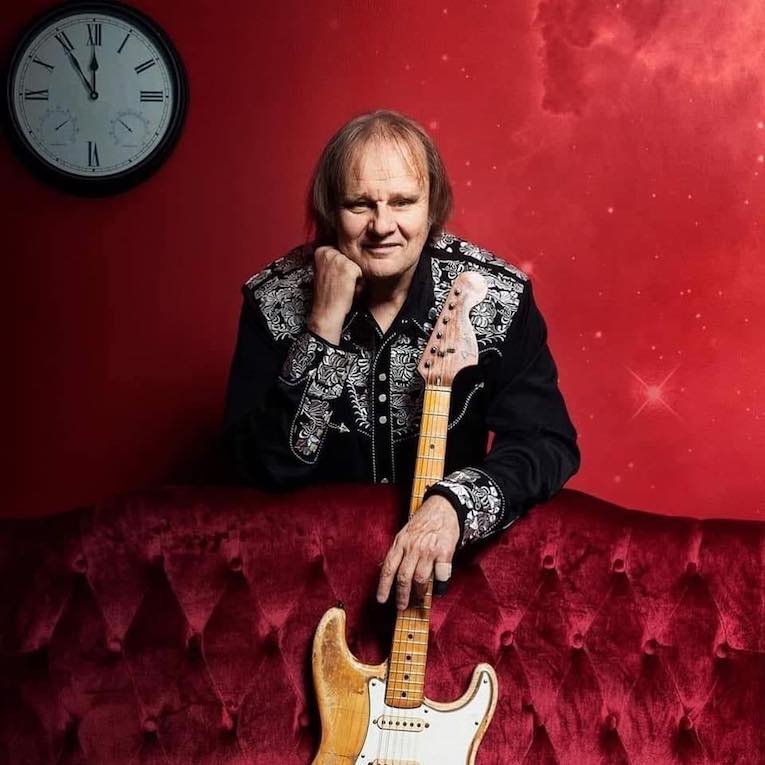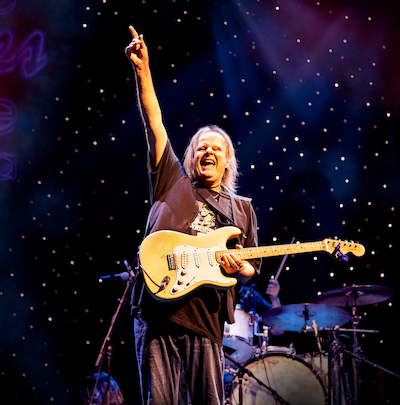
Photo: Alex Solca
By Martine Ehrenclou
Beloved blues/rock guitar virtuoso, singer-songwriter, Walter Trout, spent years as lead guitarist for John Mayall’s Bluesbreakers and Canned Heat before recording his own songs for over 20 years as a solo artist. With a five-decade career, Trout is the recipient of Blues Music Awards and British Blues Awards and is set to release his 29th solo album, Ordinary Madness on August 28 via Provogue Records. He kindly talked with us by phone.
Martine Ehrenclou: How’s that broken finger coming along?
Walter Trout: I went to the surgeon this morning and I got X-rayed and it’s healed but it’s stuck. It’s stuck in a bent L position and that’s just the way it’s going to be. I did my whole album with three fingers and that’s pretty much what I’ll be doing for the rest of my life. It is what it is. I can sit around and weep about it or just keep working on my three-finger technique, you know?
Martine Ehrenclou: You did your new album Ordinary Madness with three fingers and those guitar solos are stellar.
Walter Trout: Thank you. When I’m playing live and I got the three fingers going, there might be a little flub here and there, but when I was in the studio and doing the solos, I didn’t want to have a little missed note or something. The first song “Ordinary Madness,” I decided to do a three-chorus pretty long guitar solo because I wanted people to understand, “Yeah, okay, this is my album as a songwriter but you’re still going to get plenty of guitars so don’t worry.” (Laughter)
Martine: (Laughter) The songwriting on the whole album is so good, moving. Tell me about what Ordinary Madness means to you.
Walter: When I started writing the album, I kept coming back to thinking about my own flaws, my own limitations and my own mental things that I go through that I think everybody goes through. I think it’s summed up in the lyrics of the first song when I say, “It’s the sadness and the fear and the anger that you feel every day.” And also, in “My Foolish Pride” when I said, “I get filled up with doubts about myself.” It’s really about what we go through as humans, interior-wise, inside of ourselves. That, aging and relationships are the three themes on the album. If you listen to the first three songs in a row, they all say the same thing in their own way, you know?
Martine: Yeah, common struggles.
Walter: On “Ordinary Madness,” the last verse on that, ‘the meaning of the story I can’t find,’ means at age 69 I’ve given up trying to find the meaning of life. You know what I mean?
Martine: Yeah, I do.
Walter: And realizing that I’m never really going to know it and I’m tired of looking for it. (Laughter) When you’re young you say, “What does this all mean?” Then you’re almost 70 years old, you go, “I’m never going to know what it all means and actually, I don’t give a shit. I’m just happy to be here and still alive.” (Laughter)
Martine: (Laughter) Like you’re living in the moment.
Walter: That’s exactly it. I think with age, you get more accustomed to, “Let’s live in the moment.” On “Wanna Dance,” I’m using dancing as a metaphor for living each moment to the fullest and realizing that we are not going to live forever. Tonight, I wanna dance. That means I want to celebrate being alive. I want to take in everything about life. I want to feel it and I want to experience it and I want to be here with every ounce of my being and my essence. I want to be a part of this world.
Martine: “Wanna Dance” is a beautiful song. Did you write that shortly after your liver transplant or was that recent?

Photo: Allison Morgan Walter
Walter: Let me go back and tell you a story. When I’m on tour and I’m riding in the van with Mike Leasure and Johnny Griparic and all these guys, and maybe we have a six-hour drive, I’m sitting in the back, watching the world go by and I start reflecting on my life and I start going into all these mental things. Almost as a way of a little therapy for myself, I’m writing notes in a notebook. Not lyrics but just writing things about myself to try and get further in touch with my own feelings about things.
“Wanna Dance” says “I understand there’s good and bad here inside of me. I’ve been a victim of desires that only bring me down.” That was a line from those notes. I found a page in there that said, when I have a bad gig, I’m ashamed of myself because I feel like people paid to see me play and I let them down. I didn’t give them my best.
Martine: I can’t imagine you ever having a bad gig and I’m serious because I saw you live. You had that broken finger and your playing was just amazing.
Walter: It’s a matter to me of how much inspiration I feel when I play and how much involvement in the music.
Martine: I see.
Walter: It doesn’t happen a lot but when it does, I’m up there and I’m on auto pilot. I’m taking it for granted and then I get back to the hotel and I am ashamed of myself. I found this thing I had written in the notebook and it said, “Sometimes I do my best, but I fail. I know it happens to everyone, but I try to hide away my shame, but I end up getting all wrapped up in myself.” That’s the first verse of “My Foolish Pride. ”
I found that in a notebook and started strumming on guitar and singing and out it came. That was how this album was written. When I did Survivor Blues a couple of years ago, I was supposed to do an album of blues songs and an album of original songs. I was supposed to do them simultaneously and give the label two albums. I got halfway through the original album and then I had to go on tour, so I couldn’t finish it. When I got back from the tour, it was time to go work on the original album again. I listened to what we had done, and I threw most of it out. I went to the band and said, “We got to start over.” I chucked most of what we had. I didn’t think it was up to par. I ended up writing the songs for this album.
After going through facing death and being here for six years now and it’s a gift that I’m here, I just started doing a lot of self-reflection and these songs came out and I think it’s probably, except for Battle Scars, the most honest I’ve ever been in my writing.
Martine: That’s what I wrote down in my notes about the album–honest and vulnerable.
Walter: Yeah, it’s vulnerable, exactly. Writing songs is almost like speaking to a therapist, you know?
Martine: I do know.

Photo: Allison Morgan Walter
Walter: It’s like I can go into therapy or write a song. When I got out of the hospital after my transplant, I had to re-learn how to play the guitar. I had to re-learn how to talk and I had to re-learn how to walk. I spent a year doing that. My wife one day said to me, “Walter, you are really traumatized and you’re hard to be around. I love you, I’m glad you’re here but you’re really tough to be around for me and the kids. We’re having a tough time.” She said to me, “You either need to go see a therapist or why don’t you write a song?” She gave me that idea and then in two days I wrote 18 songs.
Martine: Oh, my goodness, 18.
Walter: That became Battle Scars. She gave me that idea. To me, songwriting is therapeutic.
Martine: Does listening to music do that for you too? Is it just playing, singing? Or is it all of it?
Walter: It’s all of it. There’s a biography of me out that a British journalist wrote, that’s on Amazon and it’s called Rescued From Reality. He called it that because he goes, “Now I know about your life and your childhood and how you found the guitar at a very early age and it became your sanctuary, it became your refuge and it became a place that you could hide from the world, in your music.” He goes, “It really rescued you from the reality of your life.”
It’s all of it. It’s playing the guitar, singing, performing and writing. It’s my whole reason to be here and it has been my reason to be here since I was 12 or 13.
Martine: It shows. You become one with your music. Tell me about “Heaven in Your Eyes.” It’s really beautiful and the guitar solo is beautiful.
Walter: Let me first tell you one thing about the guitar solo. I’ve done 13 or 14 albums with Eric Corne and I’ll play a solo and he’ll always go, “Why don’t you try that again? No, try that again.” He’s always like that. I played that solo (on “Heaven in Your Eyes”), and he said, “I think you just nailed it.” I went, “No, you’re kidding.” He goes, “No, you’ve done it. You don’t need to do that over.” That’s the only time in 14 albums he has ever said that to me. That was a shock. (Laughter)
Martine: (Laughter) Your wife, Marie wrote the lyrics to that song.
Walter: I was strumming the acoustic guitar and this melody started coming out. I said to Marie, “Hey, listen to this melody. It’s almost like McCartney-esque or something. It’s very melodic.” I go, “But it got so many syllables. I’m like, “I have no clue what to do with it.” I played it for her and her eyes glassed over, and she walked back into her office and closed the door and 20 minutes later, she walked out and said, “Here’s your lyrics.” Other than ‘heaven in your eyes,’ all those lyrics were hers.
Martine: Wow.
Walter: When I asked her about it, she says, “It’s about when you can’t find the right words to say to someone you love. You have something you need to get across or a feeling.” She nailed it.
Also, “Up Above My Sky.” I said to her, “Hey, I had a dream last night that I was playing this weird song called ‘Up Above My Sky’.” She went, “Really?” She walked away and came back 45 minutes later and said, “Here’s the song.” She handed me all those lyrics and I said, “My God, girl.”
She goes, “I got to thinking that there’s always this metaphor of darkness and light. You want to spread the light. If you think about it, at night when it’s dark out, you can almost see to the end of the universe. You can pretty much see forever through the darkness. When the daytime comes, you can’t see past the blue sky.” There’s the metaphor, “You see through the darkness to get to the light and you can grow by seeing through the darkness and making your way through it.” That’s why the last verse is, “If I can see through the darkness, I can find the light.”
Martine: You said that you’re doing it differently with this album. Can you elaborate?
Walter: When I wrote the lyrics to “Ordinary Madness,” the lyrics came first. I’ve tried to explain it to people and I’d say, “It’s not like I feel I’m mentally ill or something but the older I get, the more I face mortality and the more I realize that time is limited and how I almost desperately want to live and I want to enjoy this life that I have and I want to love my wife and my kids and I want to play for people.” I want to play for people, you know?
Martine: Of course.
Walter: Even “Heartland” is about somebody who’s not satisfied with their life who wants more and realizes that they have to go seek it out to make it happen.
Martine: It sounds like you did that.
Walter: Well, I did. I lived in New Jersey and I was 22 and I wanted to be a musician. I had songs and I was a little hot shot guitarist in south New Jersey but I was broke and struggling. I realized that if I wanted a musical career, I had to either go to L.A. or New York. I figured I had to go to L.A. I packed my VW Bug–I had a Gibson 335, a Martin D-28, a Fender Super Reverb Amp, a Mandolin, a Trumpet, all my clothes, half a pound of weed and 30 hits of LSD and $150 and I drove across the country. I came out here and said, “Here I am.”
Martine: That’s a great story.
Walter: I hallucinated my way to Los Angeles, Martine. I’m not lying. It took 11 days. I had a pup tent and went to campgrounds, camped at night and built a campfire and sat and hallucinated. But those were different days.

Photo: Allison Morgan Walter
Martine: You changed all that. Had a rebirth of sorts, at least it sounds that way. You tell me.
Walter: I think so. I mean, I’ve been clean and sober. July 9th, I hit 33 years clean and sober.
Martine: Congratulations.
Walter: Well, thanks. That’s when I really got serious. I was in John Mayall’s band. I was at the pinnacle of being a blues guitar playing sideman. I mean, his band is the pinnacle.
Martine: Oh, yeah.
Walter: Where else you going to go? When I say to people, “That’s as high up as you can go.” They say, “You could get a job with B.B. King.” I go, “Yeah, but I’ll stand in the background and play chords all night.” With John Mayall, you’re with one of the icons and every night he features you and calls your name and lets you sing.
Martine: So cool.
Walter: He pushes you to the front, he develops you. You either go solo or you have to take a step backwards when you leave his band, right? Because you’re at the peak. I was at the peak, but I was all messed up and he gave me the chance to get sober. I love the man like a father.
Martine: That’s a beautiful thing. I bet everybody’s thrilled with this album.
Walter: I think they are. I got to say, I really love this album. I listen to it a lot. Right now, having not played in front of people since the 12th of March, I put this album on and it keeps me in touch with who I am and what I do.
Martine: How it’s been for you not touring and being at home?
Walter: Touring and playing for people, to me, I need it like I need food and water, but I have tried to accept what is happening and I’ve tried to look at the positive aspects of life. The 30 years my wife and I have been together, we have never been together for four months every day like this because I’ve been on tour at least eight months of the year for those 30 years. We’re getting closer than we’ve ever been.
Martine: What’s next for you with touring or is that all up in the air because of the pandemic?
Walter: There are shows right now booked in the United States in October, November and December. I’m supposed to do shows with John Mayall and Dave Mason. All I know is, the way things are going right now, I kinda doubt those gigs are going to happen. They’re booked but we’ll see. I do have a tour of Europe in January and February and I think there’s a chance that that might happen.
What’s next for me is also this record coming out in the end of August. There’s a lot of artists I know who have made records and they’ve told me, “I’m not going to put my record out until I can tour.” My thought, my wife’s thought, and my label’s thought is, there’s people sitting at home right now who would love to hear some new music.
Martine: Definitely.

Photo: Alex Solca
Walter: Why are we holding it back and then when you can tour, everybody’s going to put out their records at the same time, right? Even though I can’t tour, we’re going to put it out and then when we can tour, we’ll play these songs. We’re pushing ahead here.
Martine: Sure seems a great time to be putting out new music. Fans are just dying for it.
Walter: I didn’t do it on purpose but the album seems to also fit the times too.
Martine: Can you tell me about that?
Walter: It’s timely. Everybody is going through a lot of mental stress with what’s going on, right?
Martine: Absolutely.
Walter: It’s just crazy days we’re living through. I never dreamed in my life that I would get to a point where concerts were just over, and it could be a year at least until they can get going in the States here.
That was something I never banked on. I always believed that entertainment was always going. I always think about The Depression when people were broke, they were out buying records by Jimmie Rodgers, The Singing Brakeman. He was the first guy (I believe) to sell a million records and he did that during The Depression because people would take whatever little amount of money they had, and they would buy one of his records because it made them feel good.
In the face of all the heartache and adversity they were going through, the music would give them a release and give them an escape. I always thought, “Whatever happens, if I can get a career going, I’ll always be able to work.” But here it is. It’s weird times.
Martine: Thank you for making the time to talk with me today. I enjoyed it so much.
Walter: I’m really enjoying talking to you, Martine.
Pre-order Ordinary Madness by Walter Trout out Aug. 28
Walter Trout Online

Jeff,
Glad you enjoyed it. He is straight forward and humble. Fascinating guy. Go for it, dig into his music. You will be happy you did. Thanks for commenting.
Love Walter. Been a big for a long enough time.
You know he puts himself totally into his music . Too bad about the finger but it seems he can still kill it.
Looking forward to hearing his new album.
This was great…..but if you want to hear more….hit up his ex drummer
Bernard Pershey for a zoom or other live interview…..
Bernie will keep you plenty busy for a while…